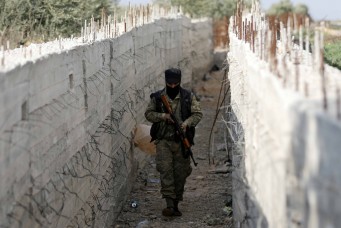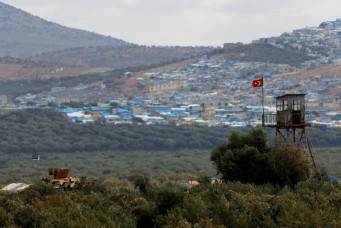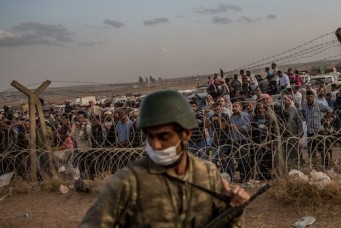Turkey’s Gradual Efforts to Professionalize Syrian Allies
Instead of putting its full strength behind unifying Syrian rebel groups, Ankara is slowly supporting that process without disturbing the status quo.

Fighters of National Army, backed by Turkey, ride on motorbikes during a graduation ceremony in the city of al-Bab, Syria August 5, 2018. Picture taken August 5, 2018. Khalil Ashawi/Reuters
Shuhada al-Sharqiya, a group in Jarabulus affiliated with the Free Syrian Army (which is controlled by Turkish-led Euphrates Shield factions), announced it was disbanding on October 28. Although the group’s leader indicated this was a voluntary decision, local sources argued that Turkey pressured the faction to dissolve itself for defying instructions. Ankara has been working on creating a proto-state within Syria out of the Euphrates Shield forces, and this incident illustrates its attempt to professionalize its rebel allies, which would further stabilize its areas of influence and potentially allow its affiliates to play a bigger role in Syria’s future. Nonetheless, Turkey’s efforts to integrate and control these allies have fallen short, whether due to lack of interest or ability. And despite cosmetic unity, those fragmented factions are still out of control, making them destabilizing factors in northern Syria.
Turkish forces, backed by Syrian rebel groups, launched Operation Euphrates Shield in northern Syria in August 2016. This operation aimed to secure its border by fighting the Islamic State and restraining the growing influence of Syrian Kurdish troops led by the People’s Protection Units (YPG), both of which Ankara labels as terrorist organizations. To manage its extensive array of armed allies, estimated to number around 6700 fighters, Turkey used the Euphrates Shield operations room to coordinate between them and issue instructions. But the official termination of the Euphrates Shield military campaign after it reportedly reached its objectives in March 2017 has created a need for a different mechanism for Turkey to control its armed allies.
Consequently, Turkey coordinated with the Syrian Interim Government to create a formal and central military structure. After months of negotiations, they announced the creation of a national army in December 2017 to unify rebel factions. Its main aim is to create a central command for rebel forces of under the interim government’s ministry of defense. The initiative also aims to professionalize the forces by creating a ranking system to establish a clear military hierarchy; providing specialized and regular military training; and establishing military police forces and courts to minimize abuses committed against civilians and prosecute the members who do so.
While the goal of this army is to control all rebel-held territories, opposition Prime Minister Jawad Abu Hatab stated that the primary objective is to maintain control of the areas held by the Euphrates Shield factions. As a first step toward joining this national army, Ankara helped coordinate a meeting between the opposition government and 33 rebel groups in the Euphrates Shield region in October 2017. Each of the rebel groups in attendance signed a document agreeing to unite their factions into three army corps as a precursor to a complete merger with the national army.
But apart from this cosmetic unification, a national structure has largely failed to materialize on the ground due to the challenges of organizing it and resistance from some of the armed groups’ leaders. Although Turkey’s rebel allies announced their merger over a year ago, they still have separate leaders, structures, agendas, and areas of influence, and the central command of the national army has no control or sway over them. This is because individuals and commanders benefiting from the current situation see any integration as a threat to their interests. For example, many of the rebel groups that left Deir Ezzor to join the fight in the Euphrates Shield region still aim to go back and liberate their areas, while local groups within the structure prioritize staying in the area to maximize their influence.
Yet fears that Turkey might cut off their support and funding—or disband them and bar access to Turkey, where many of the fighters’ relatives live—have so far kept the groups from rejecting integration outright. Therefore, many factions have agreed to merge but continue to take advantage of Turkey’s weak influence on the ground to maintain their influence. Turkey’s authority is reportedly strong near border areas such as Jarablus and al-Rai, where it has more forces, but it gets weaker further south, where local groups are enforcing their power. “The groups who want to create zones of influence are heading away from the border toward the cities of al-Bab and Akhtareen,” said Nawar. Consequently, most of the rebels’ violations against civilians and power struggles between factions are taking place in those areas, especially in al-Bab.
Despite its publicly stated desire to professionalize its allies through training and accountability mechanisms, Turkey is unable to enforce the national army framework on its divided allies. Ankara fears that the use of strict measures (such as by terminating groups’ funding) could lead to armed resistance. However, Turkey is in no hurry to professionalize them, as the current divisions still allow Turkey to control them.
Instead, Ankara has apparently decided that the safest way to manage its allies is to push slowly for integration without disturbing the dynamics on the ground. It continues to channel its support and instructions directly to each group rather than through the central command of the national army, keeping them financially dependent on Turkey. The rivalry between such factions further gives Ankara enough influence over them to secure its immediate interests in Syria, namely engaging diplomatically with Russia to prevent a regime attack on Idlib and pushing Kurdish forces out of Afrin, Tal Rafaat, and Manbij. For instance, Turkey was able to convince its allies to launch an offensive to capture Afrin in January 2018, while Idlib, a more strategically important city, was under attack by the regime.
To limit the influence of such groups, Turkey has been using different tactics, including pressuring rebel factions to hand over the border crossings with Turkey (a major source of income) to civilian entities affiliated with the opposition’s interim government. Likewise, Turkish-led efforts to clear civilian areas such as al-Bab from rebel forces and to create and train local police forces decrease rebels’ ability to extract financial benefits from checkpoints, border crossings, or domestic trade routes. Furthermore, in January the opposition government, with Turkey’s support, created a military court and police in Aleppo, which aim to limit the abuse of rebel groups, at least in theory.
Such measures can help mitigate some of the implications of the failure to professionalize Turkey’s allies. The violations committed by those rebels against residents is creating resentment toward both the rebels and their patron, Turkey. For example, armed clashes between Ahrar al-Sharqiya and members of the local al-Waki family took place on May 6, 2018. As a result, seven people were killed and more than fifty were injured. Similarly, the role of rebel groups in local governance and the courts is contributing to the ineffectiveness of those key institutions, creating resentment against Turkey for not stopping it.
Unifying Turkey’s allies in standard military structure could increase their chances of becoming part of the official armed forces in post-conflict Syria—whether through a political deal to create a joint military council or by running local areas in a decentralized country. But instead of putting its full strength behind such a project, Ankara is apparently using a mixture of tactics that slowly feeds into that process without disturbing the status quo currently existing there.
This article is reprinted with permission of Sada. It can be accessed online here.
Haid Haid is a research fellow at the International Center for the Study of Radicalization (ICSR), and a consulting research fellow at Chatham House. Follow him on Twitter @HaidHaid22.






